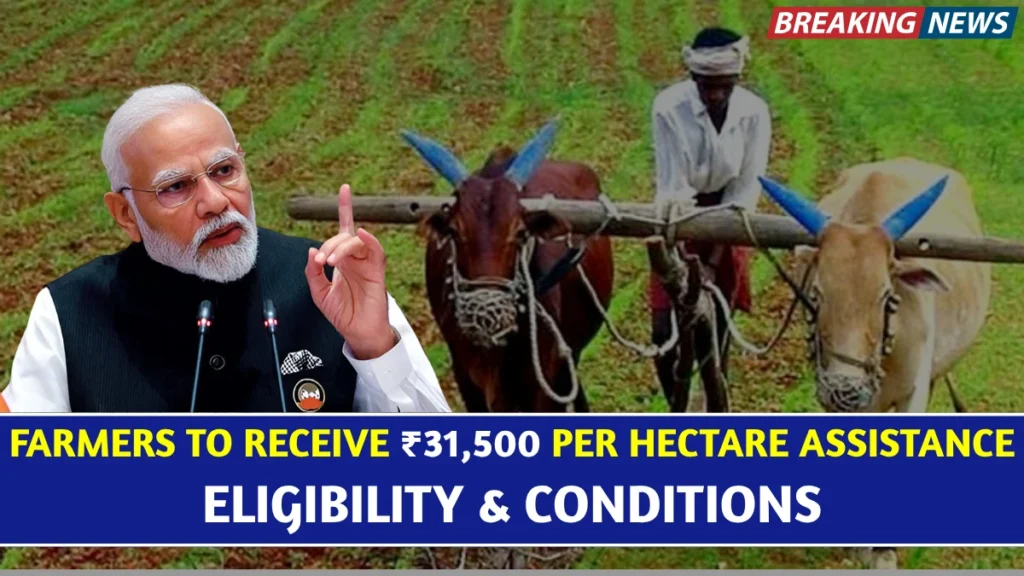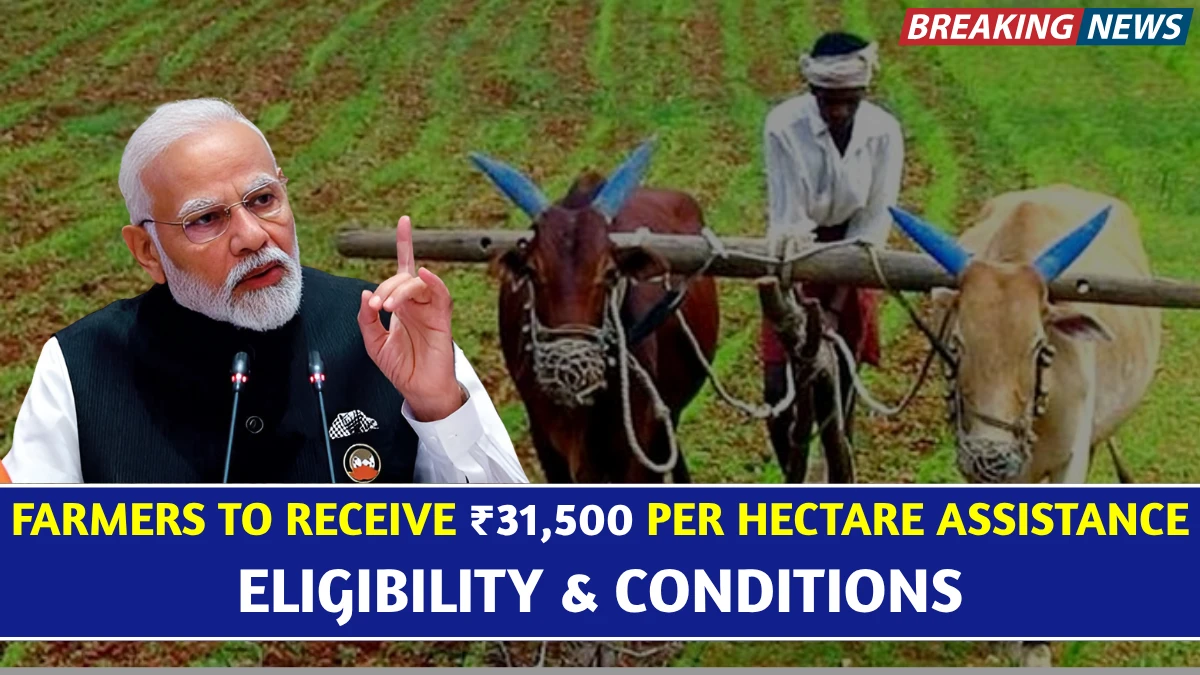PM PKVY Yojana 2025: The Pradhan Mantri Krishi Vikas Yojana (PM PKVY) 2025, a landmark initiative by the Government of India, aims to boost agricultural growth and enhance the livelihood of farmers across the country.
As part of this scheme, farmers will be provided with a financial assistance of ₹31,500 per hectare to help improve their farming practices and increase crop yields. This blog post will explore the key aspects of the scheme, including its eligibility criteria, conditions, and the support it offers to farmers in 2025.

Overview of PM PKVY Yojana 2025
PM PKVY, launched with the goal of promoting sustainable agricultural practices, is designed to provide financial aid to farmers, especially those in rural areas. The focus of this scheme is to empower farmers with the necessary tools and knowledge to improve their crop production. With ₹31,500 per hectare, the government intends to alleviate the financial burden of farming and encourage the adoption of eco-friendly and efficient agricultural practices.
Financial Assistance for Farmers
In 2025, the scheme provides farmers with a substantial financial assistance of ₹31,500 per hectare. This amount is intended to cover a wide range of expenses related to improving the quality and quantity of agricultural produce. The fund can be used for purchasing quality seeds, fertilizers, pesticides, irrigation systems, and other essential resources that contribute to enhancing farm productivity.
Eligibility for PM PKVY Yojana 2025
To ensure that the benefits of PM PKVY reach the deserving farmers, the government has outlined specific eligibility criteria for participation in the scheme. Farmers who own agricultural land, especially in rural and semi-rural areas, are the primary beneficiaries of this initiative. However, certain conditions must be met for farmers to qualify for the financial assistance under PM PKVY.
Farmers Must Own Agricultural Land
The first and foremost condition for eligibility is that the applicant must own agricultural land. The scheme is primarily designed to assist farmers who are actively engaged in farming practices on their own land. The assistance is not available to farmers who lease land for cultivation, as the scheme focuses on promoting sustainable farming techniques among landowners.
Farmers in Rural Areas Eligible
Another key criterion for eligibility is that the farmer must be residing in rural or semi-rural areas. This ensures that the benefits of the scheme are extended to farmers in regions where agricultural activities are the main source of livelihood. The government aims to uplift farmers in remote areas by providing them with the necessary resources to enhance their productivity.
Adherence to Sustainable Farming Practices
One of the primary goals of PM PKVY is to promote sustainable and organic farming practices. As a result, farmers who wish to avail themselves of the benefits must commit to using eco-friendly techniques that help conserve soil, water, and biodiversity. This includes the use of organic fertilizers, natural pesticides, and the adoption of crop rotation practices.
Conditions for Assistance under PM PKVY
While the financial assistance provided under PM PKVY is significant, it is important for farmers to understand the conditions that come with it. These conditions are designed to ensure that the funds are used appropriately and contribute to long-term agricultural growth.
Adoption of Organic Farming Practices
Farmers applying for the scheme are expected to adopt organic farming methods to qualify for the financial assistance. This includes shifting from conventional farming practices that rely heavily on chemical inputs to more sustainable alternatives. By promoting organic farming, the government seeks to reduce environmental damage and promote healthier food production systems.
Proper Documentation and Verification
To access the financial aid, farmers must submit the necessary documentation to verify their eligibility. This includes proof of land ownership, proof of residence in a rural area, and evidence of the farmer’s commitment to sustainable farming practices. The verification process is crucial to ensure that the assistance reaches the rightful beneficiaries and that the funds are utilized effectively.
Implementation of Technology and Innovation
The PM PKVY Yojana encourages the use of modern agricultural technologies and innovations. Farmers who wish to avail themselves of the assistance are expected to implement these technologies in their farming operations. This could include the use of precision farming tools, advanced irrigation systems, and smart farming techniques to increase crop yield and reduce resource wastage.
Incentives for Improved Crop Yield
As part of the scheme, farmers will be provided with incentives for improving their crop yield. These incentives are designed to reward farmers who successfully increase their agricultural output through sustainable methods. By offering such incentives, the government hopes to inspire farmers to continue improving their farming techniques and contribute to the overall growth of the agricultural sector.
Training and Support for Farmers
To help farmers make the most of the financial assistance, the government will provide training and support throughout the implementation of the scheme. Farmers will be educated on sustainable farming techniques, the use of organic inputs, and how to improve soil health. The government aims to create a comprehensive support system that enables farmers to overcome challenges and make informed decisions in their farming practices.
Impact on Indian Agriculture
The PM PKVY Yojana has the potential to revolutionize Indian agriculture by encouraging sustainable farming practices and increasing crop productivity. By providing financial support and promoting eco-friendly farming methods, the government aims to create a more resilient agricultural sector that can withstand climate change and other challenges.
Moreover, the financial assistance offered under the scheme will help reduce the dependency of farmers on external loans, which are often high-interest and financially burdensome. By improving access to resources and knowledge, the scheme aims to reduce the risks faced by farmers and ensure better long-term returns on investment.
Challenges and Concerns
While the PM PKVY Yojana promises substantial benefits, there are several challenges that need to be addressed. One of the key concerns is ensuring that the scheme reaches all eligible farmers, especially in remote areas. The implementation process must be transparent and efficient to prevent any misallocation of funds.
Additionally, although the scheme promotes sustainable farming practices, it will require a significant cultural shift among farmers accustomed to conventional methods. Educating and encouraging farmers to adopt organic and eco-friendly techniques may take time and consistent effort from both the government and agricultural experts.
Conclusion
The PM PKVY Yojana 2025 holds great promise for Indian farmers, offering substantial financial assistance and support to those engaged in sustainable farming practices. With ₹31,500 per hectare, the scheme provides a much-needed boost to farmers who are committed to improving their agricultural techniques. By focusing on organic farming, the government hopes to create a more sustainable and resilient agricultural sector. However, successful implementation will depend on overcoming challenges such as reaching remote farmers and ensuring proper education and support for sustainable farming practices. Through collective efforts, the PM PKVY Yojana has the potential to bring about significant positive change in Indian agriculture.
Disclaimer
The information provided in this blog post is based on the current understanding and details available regarding the PM PKVY Yojana 2025. The program’s features, financial assistance amount, eligibility criteria, and conditions mentioned may be subject to change based on government notifications or amendments. It is recommended that farmers and interested individuals refer to official government sources or consult relevant authorities for the most up-to-date and accurate information. The author is not responsible for any discrepancies or updates in the program’s details after the publication of this post.
